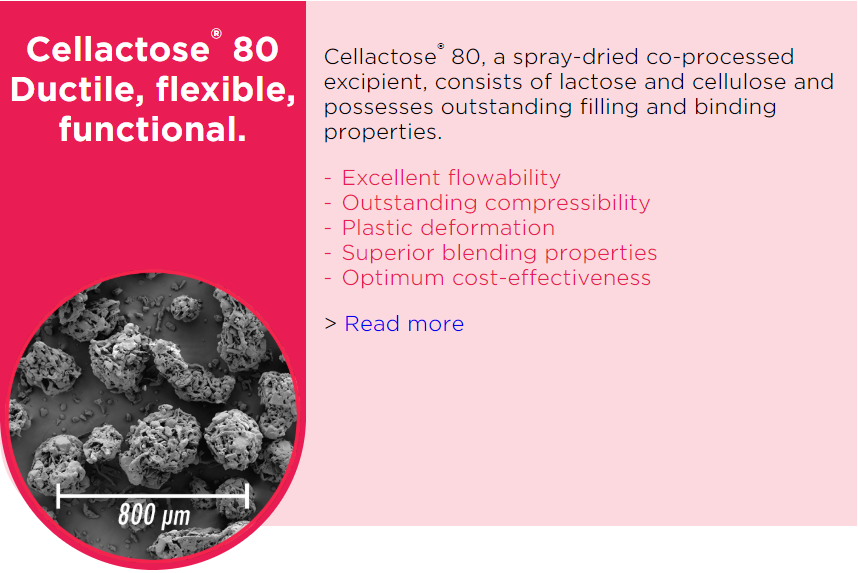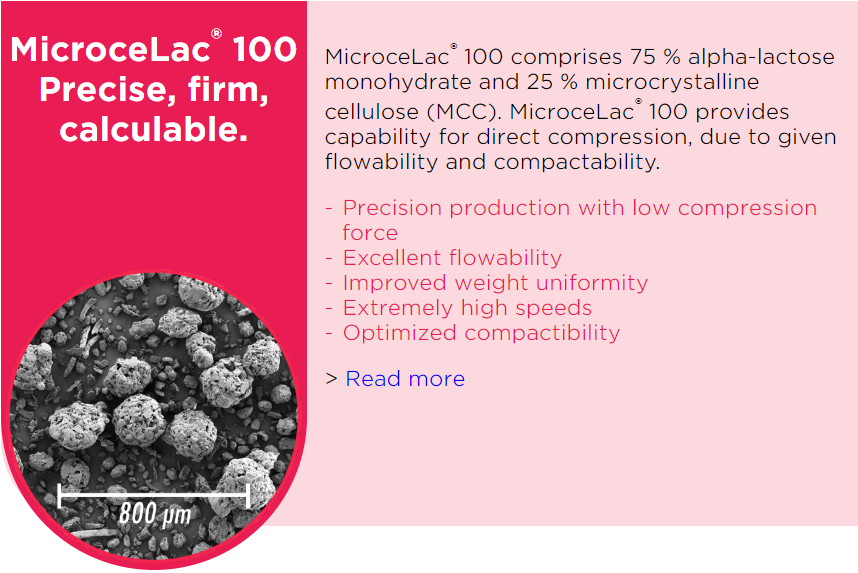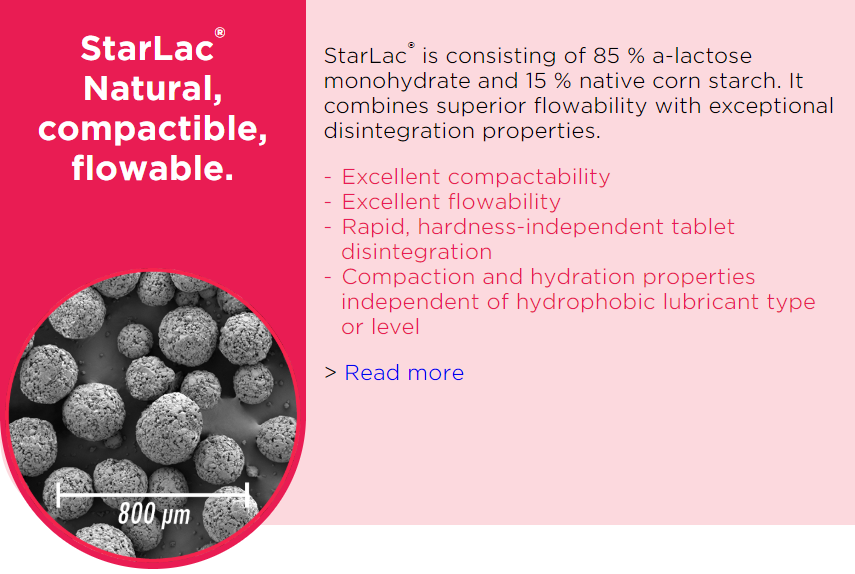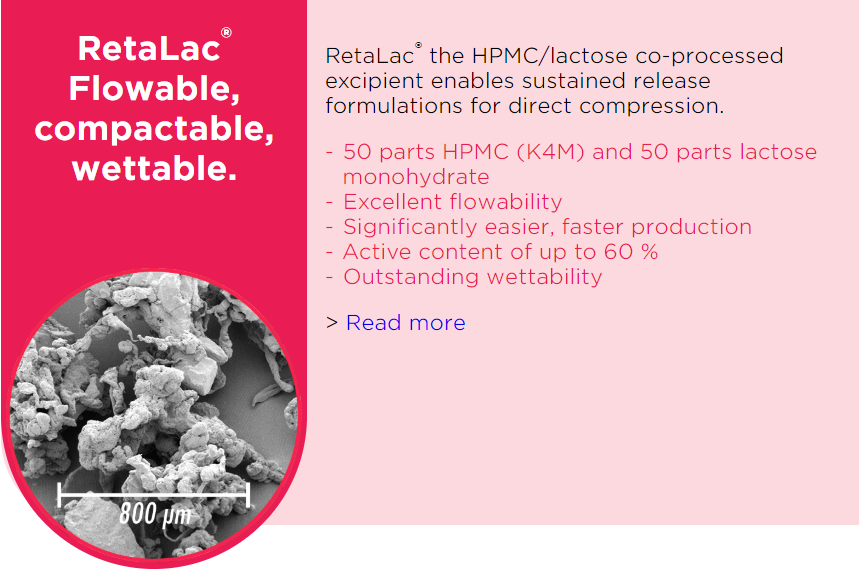Co-processed Excipients
MEGGLE Excipients:
How to register co-processed excipients (CPEs)
Co-processed excipients have been proven to be the easiest way to develop oral dosage forms such as tablets. Unfortunately co-processed excipients are still considered as risky, as their regulatory status has not been fully established.
The following overview aims to address regulatory uncertainty and highlights MEGGLE’s supportive tools, in order to prevent or minimize delays during drug approval.
Co-processed Excipients:
Drug approval process | Compendial vs. Novel Excipients
Common Technical Documentation Format – CTD
Throughout a drug approval process a team of drug regulatory experts needs to compile mandatory documentation, which comply with the common technical documentation format.
Reference: ICH Topic M 4 QCommon Technical Document for the Registration of Pharmaceuticals for Human Use; CPMP/ICH/2887/99 – Quality).
The CTD format section 3.2.P.4 Control of Excipients covers the mandatory description of the excipients used.
Such as:
• Excipient´s specification and its justification
• Excipient´s analytical procedures and corresponding validation
• Excipient´s origin (human or animal origin)
The workload for filling in this excipient section will depend on the excipient actually being used (compendial / traditional or novel).
Compendial Excipients
Compendial excipients comply with monographs published in compendias such as Ph. Eur., USP-NF, JP, CP, etc. These excipients are well accepted by the regulatory bodies. Thus, the risk of a delayed drug approval process is small or negligible for the prospective marketing authorization holder.
Novel Excipients
In this context the use of novel excipients (including also co-processed excipients) requires additional documentation (pertaining to co-processed excipients as well). In 2017, the International Pharmaceutical Excipients Council (IPEC) has published its “Co-processed Excipient Guide for Pharmaceutical Excipients” acknowledging co-processed excipients as novel excipients.
Novel excipients are defined by the International Council for Harmonisation (ICH) as follows: “Novel Excipients…excipient(s) used for the first time in a drug product or by a new route of administration”.
Regardless of the current development, MEGGLE has been producing co-processed excipients for more than 30 years, which have found their way into approved drugs (oral route of administration) throughout various countries, whose health authorities are members or observers of the ICH.
It is therefore important to emphasize, that MEGGLE’s CPEs e.g.
are not novel excipients according to the ICH definition.
As MEGGLE continues to play a vital role in the manufacturing of co-processed excipients, newly developed products will fall into the category of novel excipients making it necessary to consider excipient´s pharmacological and toxicological profile. In this regard the IPEC’s co-processed Excipient Guide for Pharmaceutical Excipients gives advice and explains procedures how to evaluate pharmacology and toxicology. These procedures are acknowledged and embraced by MEGGLE.
Therefore a maximum of regulatory certainty to all parties involved is guaranteed.
MEGGLE´s commitment to co-processed Excipients:
How MEGGLE provides multi-level regulatory support.
1) Control of Excipients
As MEGGLE fully understands the regulatory framework (ref. ICH Topic M 4 Q 2.3.P.4) in which pharma companies are operating, MEGGLE has decided to use excipients of pharmacopoeial quality for the production of its co-processed excipients. Therefore, MEGGLE does not compromise excipients´ quality.
2) Analytical procedures
MEGGLE has decided to rely on well-established pharmacopoeial analytical procedures for analyzing its co-processed excipients as much as possible. Proprietarily developed procedures and analytical validation information are shared either with the customer or the corresponding drug approving authority.
3) Supportive documentation
In order to provide adequate information in a standardized format MEGGLE has developed an EIP (Excipient Information Package) which is based on the “IPEC Excipient Information Package (EIP): Template and User Guide, 2013”.
The primary goal of this IPEC document is to provide standards for the exchange of data between suppliers and users to simplify the process of information exchange.
The MEGGLE EIP consists of the following documents with separate revision cycles:
Part I: Product Regulatory Datasheet
Part II: Manufacturing Site Quality Overview
Part III: Site and Supply Chain Security Overview
This Excipient Information Package is available for the entire MEGGLE product portfolio.
4) Regulatory Support
MEGGLE´s regulatory service is based on a strong expertise in developing innovative, functional products for application in new and existing dosage forms. All current and relevant regulatory aspects will be considered at any time.
Experienced, well-trained and highly qualified pharma experts around the world are there to serve different time zones, geographical locations and language requirements.
5. Regulation outlook
As a proud and active member of the IPEC Europe – MEGGLE is actively shaping co-processed excipients regulations for the benefits of their customers.
Our contribution to your success!
Just choose one of our
high-functional
co-processed excipients
Contact us!
MEGGLE Business Unit Excipients
Megglestrasse 6 –12
83512 Wasserburg
Germany
Phone: +49 8071 73 476
Fax: +49 8071 73 320




